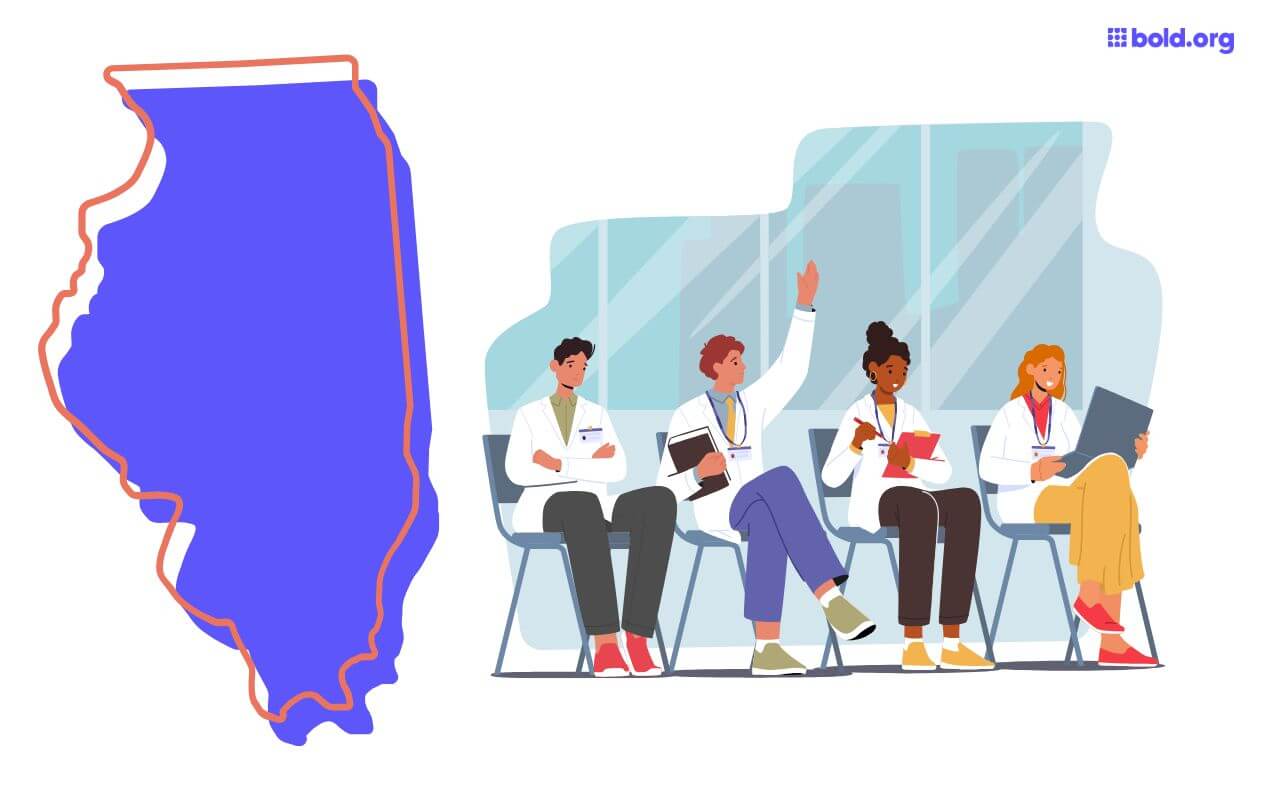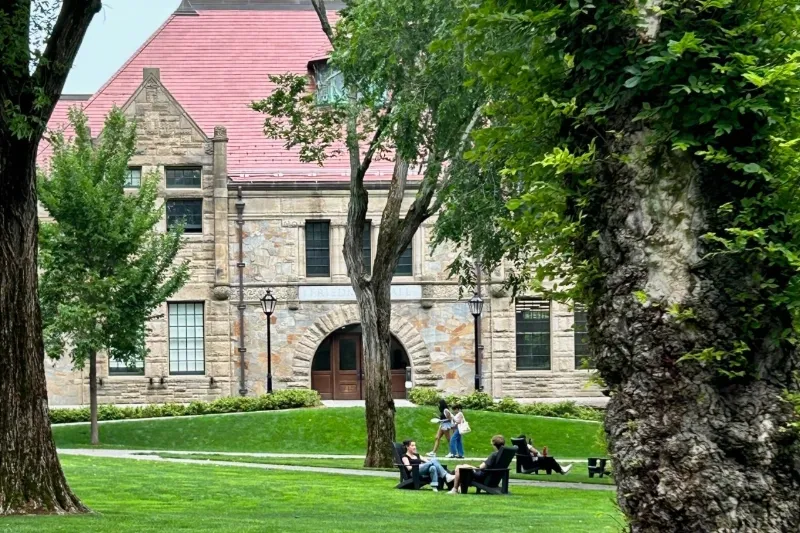Best 7 Medical Schools in Illinois in 2025


The state of Illinois is home to some of the most innovative medical schools in the United States. Whether it's a Chicago medical school or a school in a smaller town with a rural focus, the Prairie State has a medical school that fits your interests and goals within medicine. However, choosing the right medical school can be challenging when there is an abundance of quality choices at hand, and you don't know where or how to begin. Well, don't worry. You've come to the right place.
Today's article covers everything you need to know about the best medical schools in Illinois. I will also provide things to consider when choosing the right medical school for you. Making the commitment to pursue medical school is one of the most important decisions you can make, but you shouldn't jump into it blindly. Let this article be your guide to the beginning of your future.
Learn more about the best medical schools all over the United States on our Scholarship Blog. and start applying to our exclusive scholarships today!
Get Matched to Thousands of Scholarships
Create your Bold.org profile to access thousands of exclusive scholarships, available only on Bold.org.
Create Free ProfileTop Medical Schools in Illinois
Illinois has a total of nine top-rated medical schools, each with its own unique offerings and strengths. With so many medical schools in the state, Illinois has a diverse population of young medical professionals and students, all of which started on the same foot as you. As a prospective medical student, you might be wondering which medical schools in Illinois are truly the best. So, let's get into it!
1. Northwestern University Feinberg School of Medicine
- Acceptance Rate: 7%
- Average SAT Score: 1530
- Average ACT Score: 34
- Cost of Tuition: $22,095, average in-state tuition
The Feinberg School of Medicine at Northwestern University is another distinguished medical institution located in the heart of Chicago. Northwestern’s MD curriculum prepares students to become compassionate and knowledgeable medical professionals who are equipped to navigate the challenges of the modern healthcare system.
The Feinberg School of Medicine offers a stimulating and innovative curriculum that emphasizes individualized learning, early clinical exposure, and interprofessional collaboration. The MD curriculum is divided into three phases; during the first phase, medical students at Northwestern participate in a comprehensive medical education that is contextualized through early clinical experiences. During the second and third phases, students diversify their clinical training through clerkships and electives and participate in various professional development courses.
At Northwestern, medical students choose from more than twenty areas of scholarly concentrations that scaffold their journey through medical school. Students can concentrate on areas such as global health, medical humanities, health disparities, and bioethics, which bridge the field of medicine with other areas of study. All students complete a scholarly project as part of their concentration, which creates an opportunity to engage in closely mentored research and publish in a peer-reviewed journal.
Moreover, the Feinberg School of Medicine stands out with its dedication to creating an inclusive environment and curriculum that is free of bias and promotes health equity for all communities. The curriculum is guided by the core principles of anti-racism, inclusivity, and being bias-free and is regularly reviewed to ensure that it lives up to these principles. Students participate in diverse clinical rotations that instill in them a dedication to improving health outcomes for all patients.
Be sure to apply for healthcare scholarships on Bold.org and save money on medical school tuition!

2. University of Chicago Pritzker School of Medicine
- Acceptance Rate: 5%
- Average SAT Score: 1540
- Average ACT Score: 35
- Cost of Tuition: $36,991, average in-state tuition
The Pritzker School of Medicine at the University of Chicago is a prestigious medical school that ranks within the top twenty schools in the United States. Located in the vibrant city of Chicago, the Pritzker School of Medicine boasts a small class size of only 90 students per class and a wealth of research opportunities for aspiring doctors.
The Pritzker School of Medicine offers a rigorous yet flexible curriculum that integrates basic science, clinical medicine, and scholarly inquiry. Medical students at the University of Chicago can pursue a variety of scholarly tracks to personalize their medical education, including community health, health care delivery services, molecular medicine, and medical education. Pritzker also offers a variety of dual-degree programs through which students can earn a PhD, MBA, MPH, or other degree alongside their MD.
Create Your Free Profile to Apply for Scholarships Today!As one of the world’s premier research institutions, the University of Chicago has a strong research culture. One hundred percent of medical school students participate in research during their time at the Pritzker School of Medicine, which is home to twelve Nobel Prize winners amongst its faculty and alumni.
The Pritzker School of Medicine also hosts six community clinics throughout Chicago that offer free healthcare services to uninsured patients in underserved communities. Medical students have the opportunity to work in interprofessional teams alongside other health sciences students and gain hands-on clinical experience through these free clinics.

3. University of Illinois College of Medicine at Chicago
- Acceptance Rate: 79%
- Average SAT Score: 1225
- Average ACT Score: 27
- Cost of Tuition: $47,736, average in-state tuition
The University of Illinois College of Medicine is the largest medical school in the United States, with three campuses across the state of Illinois in Chicago, Peoria, and Rockford. Each campus has its own unique culture and provides students with opportunities for clinical experiences and research. As part of a sprawling community of medical professionals and medical students, students at the University of Illinois College of Medicine create invaluable professional connections and benefit from a wealth of resources at the college.
The College of Medicine offers a Doctor of Medicine (M.D.) degree, as well as various joint degree programs in Bioengineering, Clinical and Translational Science, Public Health, and more that enable medical students to explore complementary interests. Medical students can also choose to participate in optional, four-year specialized medical training pathways through the Scholarly Concentration Programs. Students in the Scholarly Concentration Programs engage in multidisciplinary scholarship, research, and community engagement in areas such as Urban Medicine, Global Medicine, and Equity Innovation Medicine.
Research is a strong area of focus at the University of Illinois College of Medicine. Medical students are able to participate in research at a number of research centers, such as the Institute for Minority Health Research and the Center for Research on Women and Gender. Students are also encouraged to engage in community service through the Hispanic Center of Excellence, which aims to improve the health outcomes of Latinx communities in Illinois, and the Center for Health Equity Using Machine Learning and Artificial Intelligence.

4. Rush University Medical College
- Acceptance Rate: 3.8%
- Current Amount of Students: 525
- Cost of Tuition: $45,805, average in-state tuition
Rush University Medical College, better known as Rush Medical College, is a private medical college located in Chicago. Founded in 1837, Rush Medical College is one of the oldest medical colleges in the Midwest and has a storied history of contributions to the field of medicine.
Students at Rush Medical College benefit from the school’s proximity to the Illinois Medical District, the largest concentration of healthcare institutions, biotechnology hubs, and other medical and technological enterprises in the state of Illinois. Furthermore, Rush Medical College is affiliated with the Rush University Medical Center, a nationally and internationally renowned academic health center. Through the Rush University Medical Center, students gain valuable clinical experiences and work with diverse patient populations.
Participating in community service is pivotal during your time at Rush University. Through the Rush Community Service Initiatives Program, students, faculty, and staff are able to practice hands-on healthcare skills while giving back to the Chicago community. The program matches students with surrounding communities based on volunteer experiences and the needs of each community.

5. Southern Illinois University School of Medicine
- Acceptance Rate: 6.62%
- Average SAT Score: 1020
- Average ACT Score: 23
- Cost of Tuition: $40,724, average in-state tuition
Located in the town of Springfield, Illinois, Southern Illinois University School of Medicine, or SIU Medicine, is a medical school with a social mission and dedication to community health.
The medical curriculum at Southern Illinois University combines hands-on teaching with small class sizes to create a strong foundation for a professional medical career. The curriculum model provides medical students with early exposure to patient care and requires that students master each area of study before moving on to the next level. Through the development of this curriculum, SIU Medicine has become a leader in innovative teaching methods across the country.
SIU School of Medicine continues to be heavily involved in the advancement of medical care in towns across central and Southern Illinois, such as Springfield, Decatur, and Quincy. The school boasts the highest percentage of medical graduates who choose to practice in rural medicine, providing desperately needed healthcare to underserved communities. Moreover, about half of the school’s graduates choose to go into primary care each year—a field that has a growing shortage of practitioners.
Students at SIU have opportunities to engage in clinical experiences at one of the largest university-owned and administered health systems in the United States, serving eight cities with thirteen clinics. Furthermore, through various rural medicine initiatives, SIU partners with healthcare organizations to provide healthcare to numerous towns and cities. As a result, SIU School of Medicine students have the opportunity to make a big impact in the field of medicine while still in school.

6. MidwesternUniversity Chicago College of Osteopathic Medicine
- Acceptance Rate: 2.7%
- Average MCAT: 508
- Cost of Tuition: $83,951, average in-state tuition
The Chicago College of Osteopathic Medicine at Midwestern University is an osteopathic medical school located in Downers Grove, Illinois. After four years of full-time study, graduates from the Chicago College of Osteopathic Medicine earn a Doctor of Osteopathic Medicine degree steeped in the osteopathic tradition.
Osteopathic physicians consider biological, sociological, and psychological aspects of healthcare in their work with patients. As an osteopathic medical school, the mission of CCOM is to train physicians to provide compassionate, high-quality care. After graduating, students have the option to matriculate into a variety of medical specialties, including primary care, surgery, emergency medicine, pediatrics, and anesthesiology.
7. Carle Illinois College of Medicine
- Average MCAT: 516
- Average GPA: 3.71
- Cost of Tuition: $80,341, average in-state tuition
Located in Champaign, Illinois, Carle Illinois College of Medicine at the University of Illinois Urbana-Champaign offers prospective doctors a unique lens on medical education that combines the practice of medicine with principles of engineering. As the world's first engineering-based medical school, Carle Illinois College of Medicine trains medical scholars to become critical thinkers and astute problem-solvers who are well-versed in the sciences.
In addition to a Doctor of Medicine degree, students at Carle Illinois College of Medicine can earn a dual degree that combines an M.D. with a Ph.D. in any graduate subject. Each course taken by medical students is designed by a doctor, scientist, and engineer, combining the expertise of each field to provide a more humanistic view of medicine for prospective doctors.
Also, students at the Carle Illinois College of Medicine receive early clinical exposure, starting in their second week of medical school. Through the Innovation, Design, Engineering, and Analysis (IDEA) projects, students are challenged to come up with real-world solutions to modern healthcare challenges.
Many prospective medical students worry about the rising cost of a medical degree and end up taking on massive student loan debt to pay for their education. Luckily, medical school scholarships on Bold.org can help reduce the financial burden of medical school and allow you to focus on your studies instead of worrying about tuition.
Though we couldn't list all the medical schools in Illinois, you're familiar with the best of the best, which means it's time to start building your school list for your future education!
How to Choose the Best Medical School in Illinois for You
Choosing the best medical school in Illinois can be easy if you know what you're looking for, and sometimes that's the hardest part: figuring out your key objectives for your education. Below are some factors to take into consideration when choosing the right medical school for you:
- Admissions criteria: familiarize yourself with each school's admission requirements
- Student success rates: consider the percentage of students who are not only admitted but have found success in the medical field at the end of their academic career.
- Learning environment: you want to make sure your learning environment supports your goals and provides a safe space and community.
- Financial feasibility: The cost of attendance is always a huge factor to consider when applying for college. Make sure you do your research on tuition rates for each school of your choice and inquire about financial aid services through them. You can also check out our medical school scholarships for more financial opportunities.
- Personal and professional goals: your school's curriculum should align with your personal and professional goals.
If you're interested in going to medical school, be sure to check out our articles on healthcare programs in other states, such as medical schools in Georgia and medical schools in Virginia. You don't want to pick just any medicine program, it's important to look around and consider other options; you never know where you might end up. Good luck!

Frequently Asked Questions About Illinois Medical Schools
How competitive is it to get into an Illinois medical school?
Admissions to Illinois medical schools tend to be quite competitive. According to most medical school admissions statistics from the American Association of Medical Colleges (AAMC), the average acceptance rate to Illinois medical schools was 1.63%, which is significantly lower than the national average of 6.8%.
How expensive is tuition at the best medical schools in Illinois?
The cost of medical school tuition can vary greatly. Most medical schools range from $10,000 to over $60,000 per year, depending on the school and the type of institution. Generally, public medical schools have lower tuition fees than private medical schools. Additionally, the cost of attending medical school in Illinois will depend on whether you are an in-state student or an out-of-state student. Out-of-state students usually pay much higher tuition than in-state residents.
What is the difference between osteopathic medical schools and allopathic medical schools?
Osteopathic medical schools follow a holistic approach to medicine that considers the patient's environment, diet, and overall well-being, while allopathic medical schools follow a traditional approach to medicine that focuses on diagnosing and treating illnesses with medications, tests, and procedures. Both MDs and DOs complete four years of medical school and a residency program of three to seven years. The main difference between these schools is the philosophy behind the training that they offer to doctors.
And don't forget to create a free Bold.org profile to start applying for scholarships!